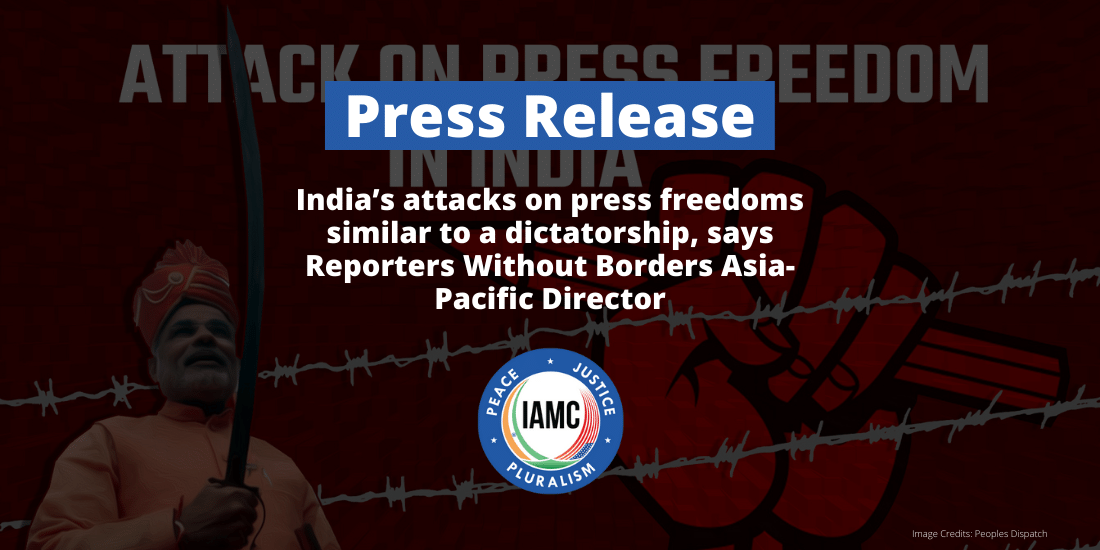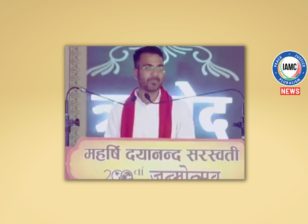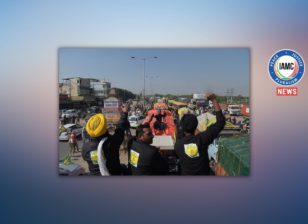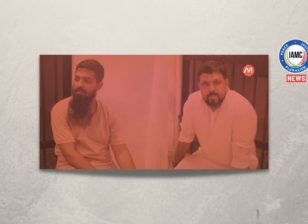India’s attacks on press freedoms similar to a dictatorship, says Reporters Without Borders Asia-Pacific Director
FOR IMMEDIATE RELEASE
Washington, DC (May 5, 2022) – The Indian government has begun mirroring China in its dictatorial treatment of journalists through harassment as well as forcing them into self-censorship, said Daniel Bastard, Asia-Pacific Director of Reporters Without Borders (RSF), in a Congressional Briefing titled “India’s Crackdown on Free Speech” on May 4.
“Nobody wants to see India become a very strong dictatorship like China, but… the situation is becoming more or less the same in some aspects,” he added, saying that India’s aggressive attempts to silence and imprison Kashmiri media persons was similar to China’s treatment of Tibetan journalists.
The briefing mainly focused on India’s steep decline in the latest Press Freedom Index ranking by Reporters Without Borders (RSF), which plunged from 142 in 2021 to 150 in 2022 among 180 countries. The accompanying report lambasts India for “violence against journalists, the politically partisan media and the concentration of media ownership,” which “all demonstrate that press freedom is in crisis.”
“We have received a lot of testimonies from journalists who were working for mainstream media who tell us there are many subjects that they don’t dare to tackle anymore… it’s safer for the journalists and [their] chief editors not to mention these embarrassing problems for the government,” said Bastard.
“We have reached a stage where there are large sections of the government who believe that they can bludgeon the small section of the media that’s still trying to hold truth to power… Those who are in power are not just intolerant; they’ve become vengeful,” said Paranjoy Guha Thakurta, a veteran journalist and filmmaker.
“Journalists who ask questions are immediately branded as traitors [and] anti-nationals… we’ve seen the laws on defamation misused, we’ve seen law enforcement agencies – including the Income Tax Department [and] the Enforcement Directorate – becoming weapons to target those who are critical of the government,” Thakurta said.
It is not alarmist, he added, to claim that the Indian government is sliding towards a dictatorship: “The media has played a sterling role, a most important role, in spreading Islamophobia in India. One out of seven Indians in a country of close to 1.4 billion has been demonized and made to feel they are second-class citizens.”
“Narendra Modi started his tenure in 2014 by attacking journalists… As far as I know, talking [about] criticizing policies of the government has become a crime,” said Niranjan Takle, investigative journalist and author of the upcoming book Who killed Judge Loya.
“[There are] physical attacks on the journalists, physical attacks on the family members, attempts to humiliate them, attempts to control them on social media.”
“The media, instead of being the watchdogs, have become amplifiers of the government narrative. And it has led to the creation of an ecosystem of vigilantes loyal to the ruling dispensation, which serves to intimidate and punish independent journalists,” said Pamela Philipose, public editor of The Wire.
“You find that in the last seven, eight years, investigative journalism [has been] killed… The irony is that when we are talking about attacks on free speech, not a single [government] agency or a single pillar of democracy… will come to rescue you,” said Bhasha Singh, a Consulting Editor with the web portal Newsclick.
“It is a great shame that India has slipped to 150 in the latest press freedom report… India doesn’t need state broadcasters because Republic TV and Times Now are precisely doing the same job,” said Salil Tripathi, Chair of PEN International’s Writers in Prison Committee.
“US government agencies such as USCIRF have specifically drawn attention to violence against journalists for the past 3 years as a reason for the State Department to designate India as a Country of Particular Concern,” said Nikhil Mandalaparthy, Advocacy Director at Hindus for Human Rights. “Given that Secretary Blinken has recently stated that the US government is monitoring human rights violations in India, it’s time to put these words into action.”
The briefing was co-hosted by Genocide Watch, World Without Genocide, Indian American Muslim Council, Hindus for Human Rights, International Christian Concern, Jubilee Campaign, 21Wilberforce, Dalit Solidarity Forum, New York State Council of Churches, Federation of Indian American Christian Organizations of North America, India Civil Watch International, Center for Pluralism, American Muslim Institution, Students Against Hindutva Ideology, International Society for Peace and Justice, The Humanism Project and Association of Indian Muslims of America.




